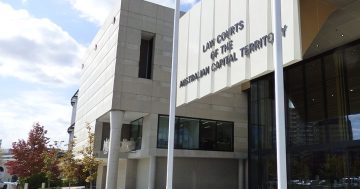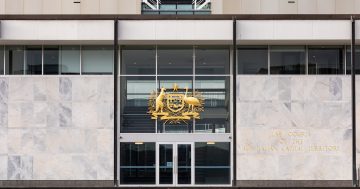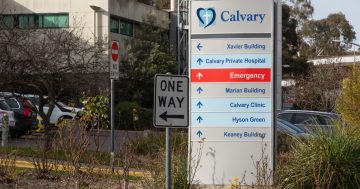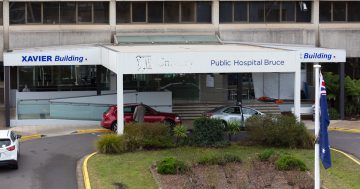
The transition of Calvary Public Hospital Bruce into the hands of the Territory has been put on hold as judges consider the validity of the law enabling the takeover. Photo: Claire Fenwicke.
The Territory won’t be able to take any steps to transition Calvary Public Hospital Bruce into the government’s hands for at least another few days as a panel of justices considers the validity of the law enabling the takeover.
Calvary Health Care’s lawyer David Williams SC argued to a full bench of the ACT Supreme Court on Wednesday (7 June) the “extraordinary and unique piece of legislation” which legalised the compulsory acquisition of the site isn’t valid because it contains “burdensome and unjust terms”.
He submitted the legislation allowed for the entire acquisition of Calvary’s business rather than just the land on which the hospital sits and its assets.
“[The acquisition] is something over and above physical assets,” Mr Williams said.
“[The provisions of the Act] are talking about the transition of the business of Calvary [to the Territory].”
He also argued the entire legislation was invalid as it contained unjust terms.
“I submit if the other terms surrounding the acquisition are burdensome and unjust, the legislation does not achieve the standard to make it just,” Mr William said.
“The acquisition has to be on just terms.”
He submitted that powers given to the Territory under the Act during the pre-acquisition phase (before 3 July 2023) were “extraordinarily broad” and knew “no bounds” when it came to what the Territory could access.
“It’s essentially to do with anything in relation to managing the operation of the public hospital,” Mr Williams said.
“The transition is occurring from day one, not from the acquisition day.”
Other arguments for unjust terms included the legislation requiring Calvary to “ensure” a safe and orderly transition, cooperation, and that everyone complied with the transition plan.
The regulations also outline that Calvary would have to oblige with other requests assisting the transition which could last up to 12 months. Mr Williams said it was an “onerous” burden.
Calvary also took issue with wording around compensation in the legislation, which allows for “reasonable compensation” rather than explicitly full compensation.
“There’s nothing in this Act that provides for Calvary to obtain just terms or reasonable compensation,” Mr Williams submitted.
“There’s some aspirational language [which says it could] but the regulation doesn’t allow for it.”
Compensation continued to be a sticking point when it came to what could be considered lost.
Mr Williams argued because the takeover was “hostile”, this added an element to the acquisition which couldn’t be covered by money.
“[This] is being done against [Calvary’s] will, and that is a burden over and above,” he said.
Chief Justice Lucy McCallum challenged this argument, saying Calvary as a whole was a corporation that couldn’t experience unfairness or “have feelings”.
“[The terms] can be objectively unfair, but that can be compensated with money,” she said.
“It can’t suffer hurt feelings; it can’t sing or dance.
“On that argument, you could never have just terms on a takeover [which a corporation considers] hostile.”
Mr Williams clarified that it was unjust that Calvary was expected to be involved with the transition long after the acquisition date, which added to the burden of the Territory “taking the castle”.
“They’ll be indebted in servitude to the future,” he said.
In response, ACT Solicitor-General Peter Garrison SC submitted the Territory was only acquiring the public hospital’s land and assets, and that the legislation’s provisions were “mechanical” to allow the effective operation of the hospital by its new owner.
He argued that the loss of Calvary’s business was a “natural consequence” and that it would be covered by just terms.
“Compensation will include the consequential loss of that business,” Mr Garrison said.
He submitted the compensation terms allowed for a “broader range of matters” than what might usually be required in the course of an acquisition.
Mr Garrison also argued any requests to be made of Calvary were just because they couldn’t be immediately imposed.
He said the regulations required the Territory to give “reasonable written notice”, and the onus was on them to “minimise interference” with the hospital’s operations.
The Territory’s written submissions challenged Calvary’s claims that regulations in the Act rendered it invalid.
“The attacks on the reasonableness and proportionality of the regulations represent an invitation for the Court to engage in judicial merits review,” it read.
“And there is no uncertainty that ought to result in the invalidity of a regulation on a proper application of the principles [argued].”
As for Calvary’s argument that the entire legislation was invalid if it contained unjust terms, the Territory rejected this claim.
“If any provision is found to be invalid insofar as it does not provide ‘just terms’, it ought to be severed from the balance of the Act,” it submitted.
Chief Justice McCallum ruled that a pause on the transition would continue until at least Friday (9 June).
She said the full bench would only consider the validity of the Act and deliver that decision no later than Tuesday (13 June). Issues about specific regulations would continue after that.
Chief Justice McCallum requested the Territory investigate whether they could hold off on any transition plans until that date and to update her by midday tomorrow on whether she would need to make further orders.





















